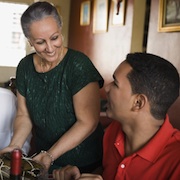 PS Productions/PhotoSpin
PS Productions/PhotoSpin
Deadly heart attacks increase during the holidays. One study even found an overall increase of 5 percent more heart-related deaths in December and January, reported WebMD.com writer Katherine Kam.
In a national 2004 study published in Circulation, researchers examined a large population of 53 million U.S. death certificates from 1973 to 2001. Researchers found increases in cardiac deaths for every holiday period they studied, except two.
It was suggested that the reason for the spike in heart-related deaths was due to people delaying getting treatment, not wanting to disrupt the holiday festivities, Kam said.
Also, during cold weather, blood vessels constrict, which raise blood pressure. Blood also clots more readily in the cold winter months. An increased strain on the heart, and too much physical exertion can trigger a heart attack.
More women than men die of heart disease each year and it is the number one killer amongst women. This is partly because heart disease symptoms in women can be different from symptoms in men. Women do not know they are having heart problems until it is already to late, the Mayo Clinic said.
Women usually have heart attack symptoms unrelated to chest pain. Pressure or discomfort in the chest is the most common heart attack symptom, but it is not the most severe or prominent in women.
According to the Mayo Clinic, heart attack symptoms in women include: neck shoulder, upper back or abdominal discomfort, shortness of breath, nausea, sweating, lightheadedness or dizziness and fatigue.
In several cases, women have microvascular disease. Microvascular disease involve blockages in the main arteries and in the smaller arteries that consist of the heart’s blood supply.
Along with high cholesterol, high blood pressure and obesity, mental stress and smoking are great risk factors in women. Low levels of estrogen after menopause pose a significant risk factor for microvascular disease in women as well.
Death rates from heart disease have dropped in the last 30 years, but they haven't dropped as much in women as in men. This may be the result of microvascular disease, says the National Heart Lung and Blood Institute.
There are several ways to reduce the risk of heart disease this holiday season.
A daily exercise routine of 30 to 60 minutes is a good way to start. Even after your holiday meals, go for a walk or try sit-ups while you watch the holiday movie marathons.
Losing 10 to 15 pounds can help to lower blood pressure and reduce the risk of diabetes, which increase the risk of heart disease, the Mayo Clinic said.
Also, before the holidays, quit or don’t start smoking and avoid saturated fat, cholesterol and salt.
Most importantly, if you feel any symptoms of heart disease, don’t postpone treatment for after the holidays. Get help right away.
Sources:
Heart Disease. Mayo Clinic. Retrieved December 10, 2012.
http://www.mayoclinic.com/health/heart-disease/HB00040
How Does Heart Disease Affect Women? National Heart Lung and Blood Institute. Retrieved December 10, 2012.
http://www.nhlbi.nih.gov/health/health-topics/topics/hdw
The Truth Behind More Holiday Heart Attacks. WebMD.com.
Retrieved December 10, 2012.
http://www.webmd.com/heart/features/the-truth-behind-more-holiday-heart-...
Reviewed December 11, 2012
by Michele Blacksberg RN
Edited by Jody Smith






Add a CommentComments
There are no comments yet. Be the first one and get the conversation started!